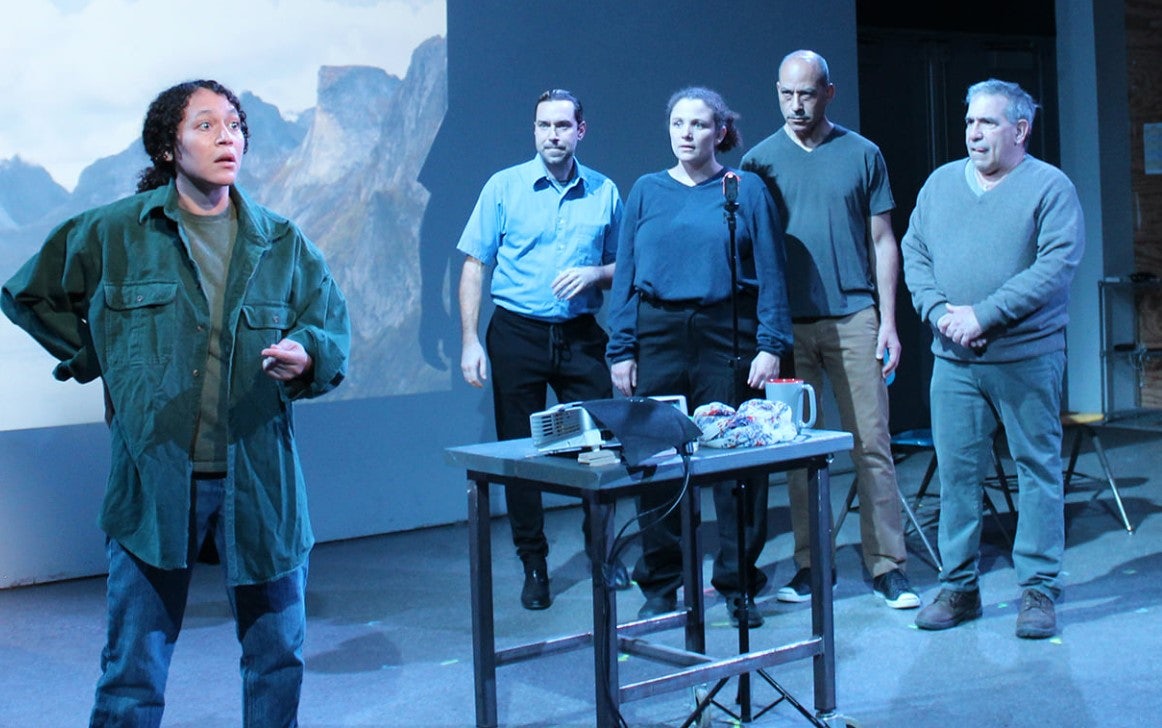‘Our profession could certainly do with more visibility.’
A Flemish theatre script making it onto the stage in the United States isn’t something we see every day. The Wetsuitman by Freek Mariën has managed that feat. The play had its première in the Cherry Artspace in Ithaca, New York, on 25 March 2022. David McKay translated ‘The Wetsuitman’ into English, and has got a taste for translating plays. ‘It’s gratifying that my name is so prominent in the publicity for this American production, along with that of the playwright. Our profession could certainly do with more visibility.’
McKay’s English translation, made possible with a grant from Flanders Literature, was immediately given a good review in The Reviews Hub: ‘It provides an opportunity for viewers to see their best and worst selves in the stories of others, and that is one of the greatest offerings a piece of live performance can give.’

Did Freek Mariën’s script have that effect on you too?
McKay: 'I originally tried to interest Freek in a translation of Waiting and Other Heroic Acts, but in response he sent me 'The Wetsuitman’. That made me even more enthusiastic. We applied, with success, for a grant for the translation of a drama text.
In the summer of 2020 it became painfully clear that Covid-19 would disrupt working life for some time yet. I went in search of a worthwhile way of using that period and started to look into the work of new writers for the theatre. The digital mentorship for theatre translators, organized by Foreign Affairs in London, came with perfect timing.
Along with actors, playwrights, translation mentors and other participants I amassed the necessary expertise. By chance, one of the students came from Syria, so ‘The Wetsuitman’, which is about the migration crisis and the jungle in Calais, became even richer in content.'
What did you find so fascinating about translating ‘The Wetsuitman’?
McKay: '‘The Wetsuitman’ is constructed in four parts. At the start Freek uses a caricatural style, which slowly shifts to a solemn mode. That way the audience is gradually immersed in the seriousness of the migration theme.
This project has certainly given me a taste for more.David McKay
Freek and I had several online video conversations in which he sketched his approach and the context. To do justice to the humour, sound and stylistic richness of his text, I had to take a creative approach. Unfortunately, in the English-language theatre world the creativity of the professional translator is often severely underestimated. Oddly, it’s often thought that only a well-known writer who doesn’t speak the source language is in a position to deal with a theatrical translation creatively. But with this translation, my own creativity and stylistic capacities carry a great deal of weight.
Incidentally, my translation was published in The Mercurian, an online magazine for theatrical translators. There I added an introduction, to point out a few things for future directors and actors.'
You have extensive experience as a literary translator, but until recently you were relatively unknown in the world of English-language theatre.
McKay: 'True. The mentorship enabled me to build a network. At the end of the series of lessons the translation was shown to other people, which was the ideal opportunity to invite a number of foreign theatre companies. That’s how I came into contact with Samuel Buggeln, and a few months later he joined an online reading of the English translation by Shakespeare is Dead. He later took on the task of directing the performance in the Cherry Artspace. After that, London took the bait. ‘The Wetsuitman’ will be performed there in the autumn by the Foreign Affairs theatre company. This project has certainly given me a taste for more.'
Books translated into English by David McKay include War and Turpentine by Stefan Hertmans, Multatuli's classic ‘Max Havelaar’ and ‘Everything to Nothing’ by Geert Buelens. He is currently working with fellow translator David Colmer on a translation of Revolusi by David Van Reybrouck. In August both translators will stay in the Antwerp Translators’ House to consult with each other and with the author.
‘The Wetsuitman’ has also been translated into German, by Barbara Buri (Verlag der Autoren), and has won the international KAAS&KAPPES prize. An audio adaptation of an excerpt from the script was presented at the DramatikerInnenfestival in Graz in 2021. In 2019 ‘The Wetsuitman’ was nominated for the 2019 Toneelschrijfprijs. Het Kwartier, the company that originally performed the play in Dutch, also made a podcast of it in recent years in collaboration with Lucas Derycke and deBuren.